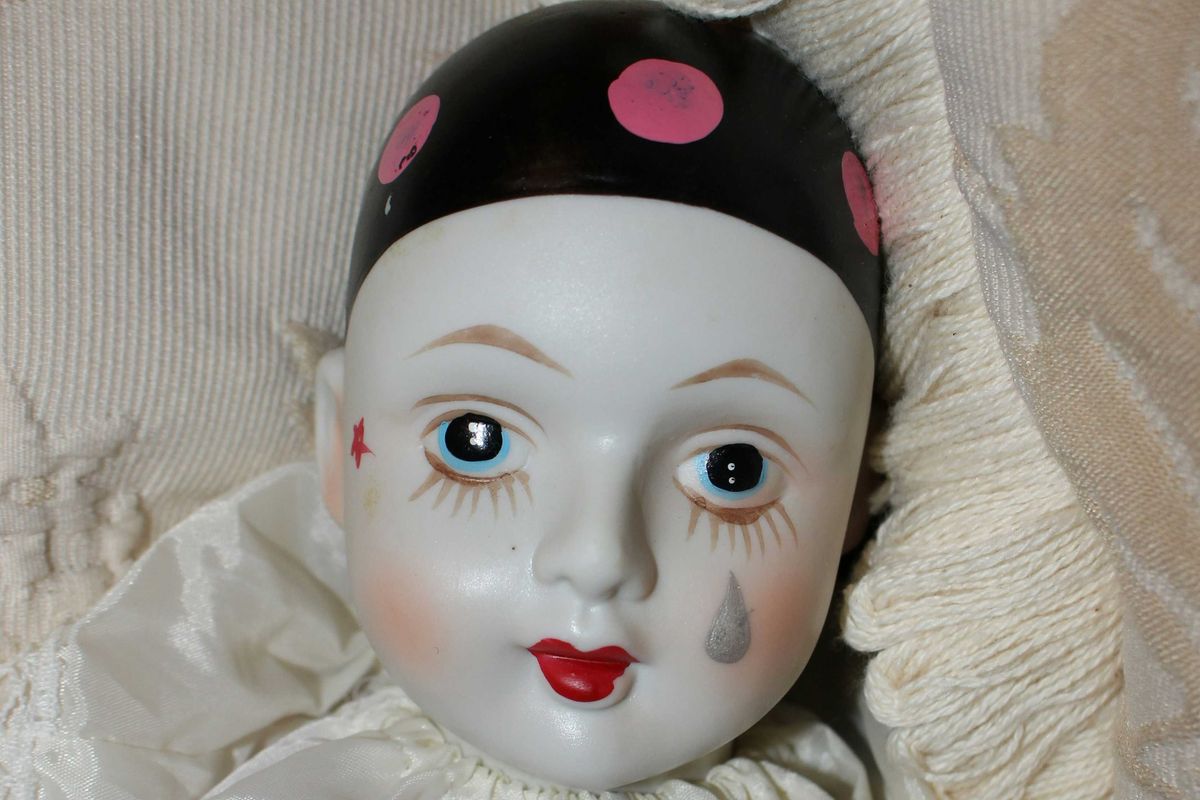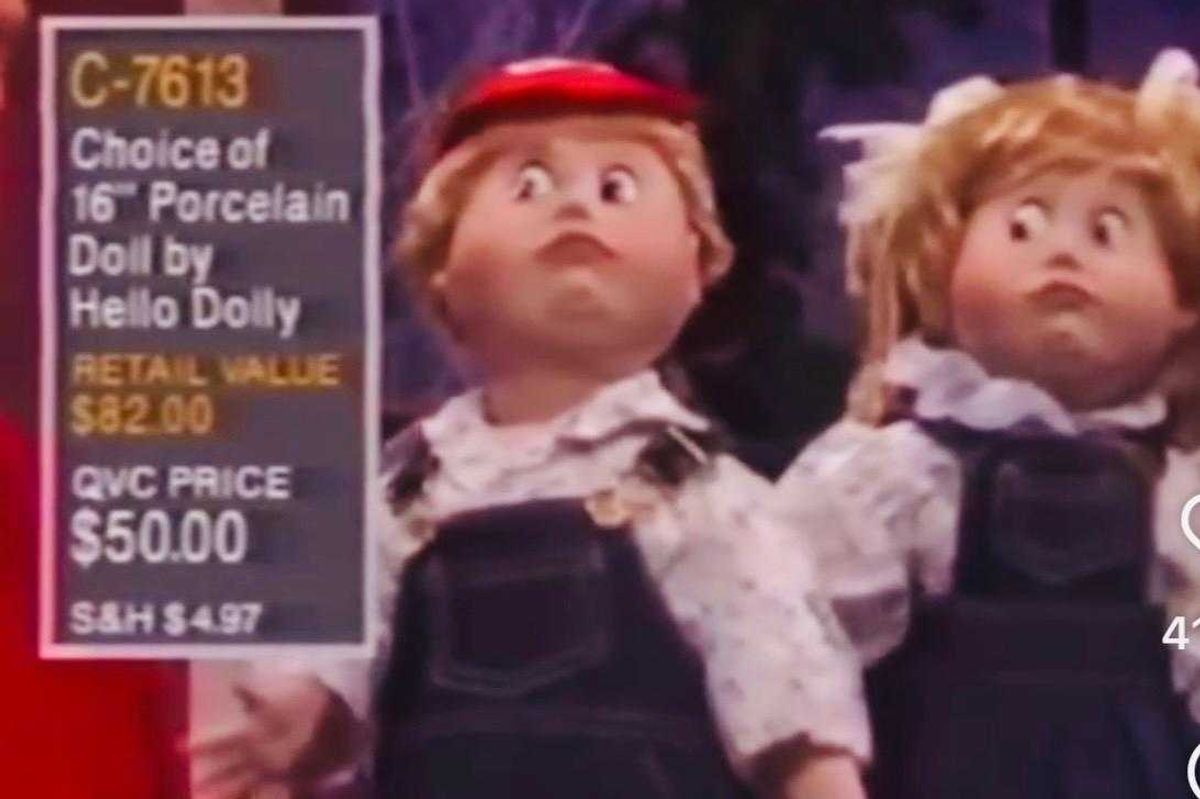A grainy 1991 QVC infomercial 'starring' two terrifying porcelain dolls is triggering the best reactions
Did anyone actually buy these?
Two porcelain dolls being sold on QVC in 1991.
One of the most wonderful attributes of a QVC host is their ability to sell the heck out of anything. In 1991, this was the job of one such woman tasked with selling two porcelain dolls from the “Hello Dolly” collection by Albert E. Price. (A few online sleuths pegged her as Judy Crowell, though Upworthy spoke with her and she didn't recall.)
Whoever she was, this was quite a feat as these weren’t just any dolls. They were wide-eyed, cleft-chinned little siblings named Jaime and Jason. And they were certainly unique. Described as 16 inches and porcelain, the “brother/sister team” were selling for $50 each. (On screen, there’s a note that they retailed at $82 apiece.)
A clip of the set being hawked on QVC is making the rounds on social media, and it has many people genuinely intrigued. In the @Totally80sroom clip, we see two almost puppet-looking dolls, a boy and a girl, each clad in overalls with golden blonde hair. Jason is wearing a red hat, while Jaime has white bows in her hair. But it’s their expressions that truly stand out: both might be described by some as “frightened-looking” thanks to their intense, unique stares.
The camera zooms in on Jaime, who seems as if she’s side-eyeing the host with a tiny tear in one eye. The host asks, “Do they remind you of your two little ones? Or do they remind you of you and your brother when you were this age? Up to no good! Being put on restriction!”
She then laughs and tells a delightful story from her childhood. “Who was it… Jeff said to me, ‘Restriction? Who gets put on restriction? You get grounded!’” She lets out a hearty laugh. “Well, I was put on restriction! In first grade. And I remember my restriction was I couldn’t leave my own front yard. So I used to go up to the border. My border, where the grass—our grass—met the neighbor’s grass, and stand right on the edge. And say, ‘Nope! I can’t come over! I’m on restriction.’ So by the time the spanking was over, and all the sadness is gone from your eyes, then it became kind of a game.”
She pauses as if she's just remembering that she has a job to do. “And that’s probably what will happen to these two too. Fifty dollars for Jaime. And fifty dollars for Jason. It is your choice of porcelain dolls from Hello Dolly.”

The comments are fabulous. One points out the obvious. “They’re cute until you wake up in the middle of the night because of a noise and they’re sitting there staring at you!” Another has a similar thought. “They’ve looked like they’ve seen some stuff they weren’t supposed to.”
This person focuses on the excellent professionalism of the QVC host: “This hostess deserves an Academy Award for filling time talking about those horrendous dolls.”
These wouldn’t be the first dolls to raise some eyebrows. If TV and movies were an indication of the toys that kids had back in the '80s and '90s, it would seem we were all surrounded by clowns and Chucky dolls. While yes, we did have a few such things, they became more of a symbol of fear in media than in real life.
In a piece for Collider, feature writer Jenna Rae Isley discusses the 1982 Spielberg-written classic Poltergeist, in which a child’s toy clown becomes a nightmare for the audience. “In reality, a clown doll is just a clown doll. But in our imaginations and in Poltergeist, a clown doll is a sinister, watchful force, lurking ominously in the corner of our rooms, keeping us perpetually on edge until it ultimately makes its move.”
The very scary clown scene from the film Poltergeist. www.youtube.com, Moyer Movies
But according to research conducted by Scientific American staff, there are actual reasons that people across many cultures are afraid of clowns. After sending out a questionnaire with various clown-based scenarios, more people answered that they had coulrophobia due to ‘negative portrayals of clowns in popular culture’ rather than actual ‘frightening experiences with clowns.’” In other words, movie makers and artists determined them to be scary…and so they became scary. (Though according to the same research, some are truly afraid of the unsettling makeup, even that of Ronald McDonald.)
It’s worth noting that most people, at least according to this survey, are afraid of clowns because they’re masked. “In fact, the strongest factor we identified was hidden emotional signals, suggesting that for many people, a fear of clowns stems from not being able to see their facial expressions due to their make-up. We cannot see their ‘true’ faces and therefore cannot understand their emotional intent.”
To that point, Jaime and Jason do not seem to be hiding their true intent. They just seem scared…perhaps because they saw a clown.

